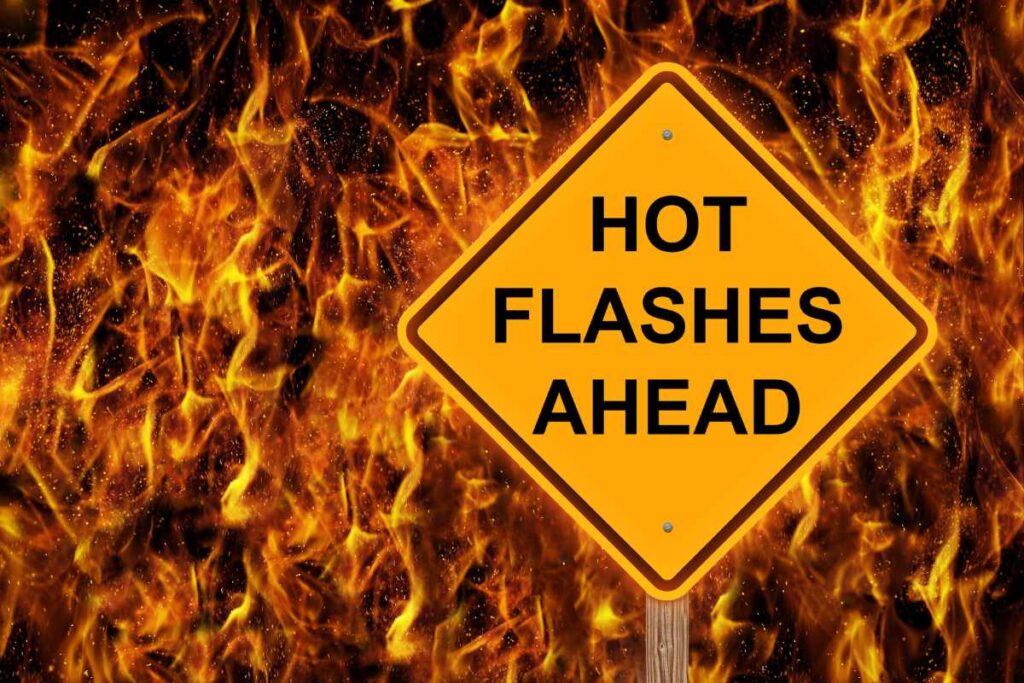A new non-hormonal medication, LYNKUET™ (elinzanetant), offers relief for women+ who experience menopause-related hot flashes, giving women+ another FDA-approved option for this common symptom. Hot flashes are disruptive; they can bring on other symptoms and can impact your risk of heart disease and dementia. So, this new choice means women no longer have to suffer and “suck it up” in silence. LYNKUET may even help your sleep, too. Learn how this medication works to bring relief for women with hot flashes.
LYNKUET offers another hormone free option for hot flashes
LYNKUET is a new non-hormonal medication option approved by the FDA (2025) to help women manage disruptive hot flashes, which sometimes lead to cold flashes.
LYNKUET™ is a dual neurokinin receptor antagonist, a new class of drugs, approved by the Food and Drug Administration in October 2025. It has been recognized as an important advancement because it targets the area of the brain responsible for temperature regulation, and therefore hot flashes, and may provide additional benefits like sleep.
Does it stop hot flashes?
No. Elinzanetant does not stop hot flashes from happening. It reduces their frequency and severity.
Does it help any other symptoms?
While not the primary benefit, yes, LYNKUET™ can also help improve sleep.
Sleep and hot flashes are interconnected, with hot flashes often happening at night. When that happens, women refer to them as night sweats. And that sudden rush of heat can disrupt sleep.
How is this hot flash medication taken?
Women+ take one 120-milligram pill once daily in the evening, with or without food, to relieve hot flashes.
Taking it in the evening may help manage potential drowsiness, a side effect of this medication.
Drowsiness concerns
One consideration with LYNKUET is the possibility of central nervous system (CNS) effects, including fatigue and sleepiness.
These symptoms can be more noticeable in the first few weeks of treatment.
Your doctor should discuss these potential effects and answer your questions before starting treatment.
Other side effects
Like all medications, there are potential side effects.
Other possible side effects include, but are not limited to:
- Fatigue
- Sleepiness (somnolence)
- Elevated liver enzymes (hepatic transaminase elevations)
- Back pain
- Abdominal pain
Because LYNKUET can cause drowsiness or sleepiness, you should be cautious when driving, operating machinery, or doing other activities that require you to be alert, especially when you first start taking the medication or after a dose increase.
These CNS effects may be more noticeable in the first few weeks of treatment.
Before starting this medication, your doctor should assess your overall health and may perform baseline bloodwork.
Tell your doctor if you experience:
- Unusual tiredness or fatigue that interferes with daily activities
- Excessive sleepiness during the day
- Any new or worsening symptoms
If you have concerns about side effects, talk with your doctor. They can help determine if adjusting the timing of your dose or other strategies might help.
LYNKUET™ clinical results
The medication was studied in two Phase 3 clinical trials called OASIS 1 and OASIS 2, which included over 1,900 women experiencing moderate-to-severe vasomotor symptoms.
After 12 weeks of use, clinical study participants saw significant reductions in both the frequency and severity of their hot flashes compared to placebo.
In the studies, women experienced meaningful improvements in moderate-to-severe hot flash frequency as early as week one, with continued improvement throughout the treatment period.
They also saw improvements in the severity of their symptoms and their quality of sleep.
Who should not take it?
You should not use LYNKUET, due to contraindications, if you have:
- Severe liver impairment (Child-Pugh C)
- End-stage renal disease or are on dialysis
- Take medications that are strong CYP1A2 inhibitors (such as fluvoxamine or certain antibiotics)
Tell your doctor about any herbal medicines, supplements, vitamins, prescription medication, or other over-the-counter medications you’re taking.
LYNKUET™ can affect how other medications work, and those other medications may also affect how LYNKUET™ works. This is especially important if you take medications that can cause drowsiness, as combining them with LYNKUET may increase sleepiness.
How LYNKUET™ works
LYNKUET™ works by interacting with brain chemicals called neurokinin B (NKB) and substance P, which bind to NK3 and NK1 receptors in the part of your brain that regulate temperature.
Before the menopause journey begins, neurokinin B (NKB) and estrogen are balanced. When balanced, they regulate the body’s temperature control in the brain.
As hormones fluctuate and drop during the transition, estrogen and NKB are thrown off balance. That can cause hot flashes.
LYNKUET™ helps to bring back that balance by blocking both NK3 and NK1 receptors to reduce the number and intensity of hot flashes.

How is this hot flash medication taken?
Women+ take one 120-milligram pill once daily in the evening, with or without food, to relieve hot flashes.
Taking it in the evening may help manage potential drowsiness, a side effect of this medication.
Drowsiness concerns
One consideration with LYNKUET is the possibility of central nervous system (CNS) effects, including fatigue and sleepiness.
These symptoms can be more noticeable in the first few weeks of treatment.
Your doctor should discuss these potential effects and answer your questions before starting treatment.
Other side effects
Like all medications, there are potential side effects.
Other possible side effects include, but are not limited to:
- Fatigue
- Sleepiness (somnolence)
- Elevated liver enzymes (hepatic transaminase elevations)
- Back pain
- Abdominal pain
Because LYNKUET can cause drowsiness or sleepiness, you should be cautious when driving, operating machinery, or doing other activities that require you to be alert, especially when you first start taking the medication or after a dose increase.
These CNS effects may be more noticeable in the first few weeks of treatment.
Before starting this medication, your doctor should assess your overall health and may perform baseline bloodwork.
Tell your doctor if you experience:
- Unusual tiredness or fatigue that interferes with daily activities
- Excessive sleepiness during the day
- Any new or worsening symptoms
If you have concerns about side effects, talk with your doctor. They can help determine if adjusting the timing of your dose or other strategies might help.
LYNKUET™ clinical results
The medication was studied in two Phase 3 clinical trials called OASIS 1 and OASIS 2, which included over 1,900 women experiencing moderate-to-severe vasomotor symptoms.
After 12 weeks of use, clinical study participants saw significant reductions in both the frequency and severity of their hot flashes compared to placebo.
In the studies, women experienced meaningful improvements in moderate-to-severe hot flash frequency as early as week one, with continued improvement throughout the treatment period.
They also saw improvements in the severity of their symptoms and their quality of sleep.
Who should not take it?
You should not use LYNKUET, due to contraindications, if you have:
- Severe liver impairment (Child-Pugh C)
- End-stage renal disease or are on dialysis
- Take medications that are strong CYP1A2 inhibitors (such as fluvoxamine or certain antibiotics)
Tell your doctor about any herbal medicines, supplements, vitamins, prescription medication, or other over-the-counter medications you’re taking.
LYNKUET™ can affect how other medications work, and those other medications may also affect how LYNKUET™ works. This is especially important if you take medications that can cause drowsiness, as combining them with LYNKUET may increase sleepiness.
How LYNKUET™ works
LYNKUET™ works by interacting with brain chemicals called neurokinin B (NKB) and substance P, which bind to NK3 and NK1 receptors in the part of your brain that regulate temperature.
Before the menopause journey begins, neurokinin B (NKB) and estrogen are balanced. When balanced, they regulate the body’s temperature control in the brain.
As hormones fluctuate and drop during the transition, estrogen and NKB are thrown off balance. That can cause hot flashes.
LYNKUET™ helps to bring back that balance by blocking both NK3 and NK1 receptors to reduce the number and intensity of hot flashes.

Other hot flash medications
LYNKUET™ is one option to treat hot flashes, but there are others, including hormone therapy and non-hormonal medications:
- VEOZAH™ (fezolinetant) – another NK3 receptor antagonist approved in 2023.
- Brisdelle® – a low-dose antidepressant and the first non-hormonal FDA-approved hot flash medication
- Other anti-depressants – SSRIs and SNRIs/SSRIs used off-label, including citalopram (Celexa), Sertraline (Zoloft), escitalopram (Lexapro), fluoxetine (Prozac), paroxetine (Paxil), duloxetine (Cymbalta), venlafaxine HCI (EFFEXOR XR®), and desvenlafaxine (Pristiq).
- Gabapentin and Lyrica – anti-seizure medications used off-label
- Clonidine – high blood pressure medication used off-label
- Hormone therapy (HT) – talk to your doctor about an individualized plan for HT
Other treatment options
You can also try cognitive behavioral therapy or CBT, which focuses on your brain to reduce hot flashes.
Nutrition also plays a role. Certain foods and alcohol can trigger hot flashes. Acupuncture, herbal medicine, and mindfulness have also been found to be effective in bringing relief to many women.
The bottom line? You have options!
Instead of suffering in silence, make a change for the better.
Consult with a clinician with the training and expertise in the management of the menopause journey to design the plan that’s best in your particular situation.
FDA Approves LYNKUET™ (elinzanetant) for Treatment of Moderate to Severe Vasomotor Symptoms Associated with Menopause | Bayer Press Release, October 24, 2025
LYNKUET™ Prescribing Information | U.S. FDA, October 2025
Elinzanetant for the treatment of vasomotor symptoms associated with menopause: OASIS 1 and 2 randomized clinical trials | JAMA. 2024;332(16):1343-1354
Modulation of body temperature and LH secretion by hypothalamic KNDy neurons: a novel hypothesis on the mechanism of hot flushes | Rance NE, et al. Front Neuroendocrinol. 2013 Aug;34(3):211-27
UA Scientist’s Research May Lead to Treatment for Hot Flashes | University of Arizona News, June 2017
You may also like…

Hormone-Free Hot Flash Relief: 12 Non-Hormonal Medications To Try
Want to beat the heat from hot flashes hormone-free? Try these non-hormonal hot flash medications that are FDA-approved or used off-label.

VEOZAH: Medical Breakthrough Gives Women+ More Hot Flash Treatment Options
VEOZAH (fezolinetant) is a new breakthrough medication for hot flashes, that’s non-hormonal. It can reduce the frequency and severity.

7 Hot Flash Trigger Foods To Stop Eating During Menopause
Some foods can cause hot flashes and other menopause symptoms. Stop eating these foods if you want to use food to manage how you feel.

